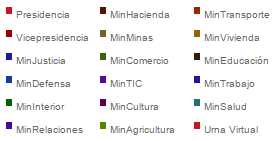Colombia will have its version of "Carbon Calculator" within a year
Bogotá, October 25, 2013 (MADS). With the presence of the British Ambassador, Lindsay Croisdale-Appleby; the delegate of the Ministry of Environment, Housing and Territorial Development, Rodrigo Suarez, and the Resident and Humanitarian Coordinator of the United Nations and UNDP representative in Colombia, Fabrizio Hochschild, an agreement was signed to adapt to Colombia's "Carbon Calculator" previously made by the United Kingdom.
The tool, known as "2050 Calculator" has been used in the UK to facilitate the planning of 2050 budgets, and the most important benefit is the use of taking a large amount of data and make them understandable to the senior members of the Government, to guide them in making decisions about what to do about climate change in the country; and allows transparent communication between the government and interest groups.
In the case of Colombia, this tool will show different actors possible options that the country could opt to reduce emissions and save energy in a timeline that goes up to 2050. It will cover major economic sectors such as energy, mining , industry, agriculture, transport, buildings and waste, among others.
This calculator was developed as part of the Strategy Colombian Low Carbon Development, led by the Ministry of Environment, Housing and Territorial Development and the National Planning Department, with support from UNDP, which aims to mitigate emissions of greenhouse gases causing climate change, predispositions of the main economic sectors by 2040.
The Colombian version of "2050 Calculator" will be launched within a year and posted on a Web format simulation animations for the general public, and in a version of Excel experts. All information and variables on the tool will be transparent and accessible to everyone.
At the signing ceremony, held at the British Embassy, the ambassador of that country in Colombia, Lindsay Croisdale-Appleby, he said: "Recent studies show that South America is the only continent in the world whose productivity ratio remains above the extraction rate. But as we have seen in other parts of the world, this situation can change suddenly. "
Therefore, he added, "it is important to find a way to safeguard natural resources in South America for future generations and develop business models that produce not only profits but also help to preserve the environment."
The Resident and Humanitarian Coordinator of the United Nations, Fabrizio Hochschild said lower emissions of greenhouse gases is a priority for everyone.
"To achieve this purpose it is necessary to have concrete, viable and workable tools that deal with such a complicated and politically polarized debate can give specific arguments to raise awareness both in the economic sectors themselves and society in general, on which our emissions are, how they affect the planet and what we can do to reduce them. "
This project aims to strengthen the Colombian strategy of low carbon development in decision-making on development alternatives that can have a significant impact on future greenhouse gas emissions in the country and in the socialization of climate change issues to stakeholders and the general public.
The calculator allows users to create their own mix of different levels of ambition by sector and know the consequences of these decisions on the future of emissions of greenhouse gases.
For more information on the calculator you can see https://www.gov.uk/2050-pathways-analysis (link is external).




